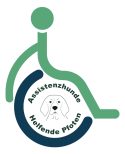Getting on the dog with ME/CFS: How an assistance dog can make life easier
What is ME/CFS?
ME/CFS, or myalgic encephalomyelitis/chronic fatigue syndrome, is a serious physical illness that affects many areas of the body. Those affected suffer from extreme fatigue, pain, circulatory problems and dizziness. Another prominent symptom is PEM (Post-Exertional Malaise), where symptoms worsen significantly after physical exertion. ME/CFS is often misunderstood and dismissed as a mental illness, but it is a serious physical illness.
Living with ME/CFS
Everyday life with ME/CFS is a major challenge for many people. Many of those affected are no longer able to work and have to rest for most of the day and cannot leave their bed or house. Activities such as shopping or showering can be overwhelming. An important strategy for dealing with ME/CFS is pacing, in which those affected manage their energy well in order to get as much done as possible without exacerbating their symptoms. Aids such as wheelchairs or walking frames and the support of family and friends are essential for many.
The role of assistance dogs
Assistance dogs can provide crucial support for people with ME/CFS and make their lives much easier. They are specially trained to help in various areas:
- Recognize health problems: Some assistance dogs can sense when their owners are likely to suffer from weakness or a lack of energy in the near future and warn them in good time.
- Cognitive support: Dogs can remind you of important tasks such as taking medication or making appointments.
- Physical assistance: They support their owners by picking things up, bringing objects or keeping their balance.
- Emotional support: An assistance dog provides comfort and helps to alleviate the emotional burden associated with ME/CFS.
Challenges when using an assistance dog
Despite the many advantages of an assistance dog, there are also some challenges:
- Training costs: Training an assistance dog is expensive and many people have to save for a long time or look for financial support.
- Care requirements: Assistance dogs need regular care, food and exercise, which can be an additional burden for seriously ill people.
- Misunderstandings in public: Some people do not understand why an assistance dog is allowed to be taken into stores or on public transport. This can lead to misunderstandings or conflicts.
Conclusion
An assistance dog can make life much easier for people with ME/CFS by helping with daily tasks, providing security and emotional support. However, before deciding to get an assistance dog, those affected should think carefully about whether they can take on the responsibility of another living creature. However, with the right planning and support, an assistance dog can be a valuable and loyal companion.

